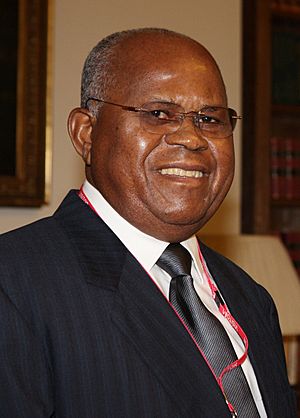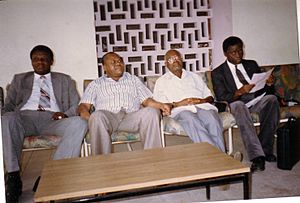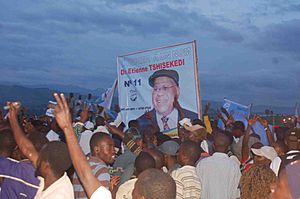Étienne Tshisekedi facts for kids
Quick facts for kids
Étienne Tshisekedi
|
|
|---|---|

Tshisekedi in 2011
|
|
| Prime Minister of Zaire | |
| In office 2 April 1997 – 9 April 1997 |
|
| President | Mobutu Sese Seko |
| Preceded by | Léon Kengo wa Dondo |
| Succeeded by | Likulia Bolongo |
| In office 15 August 1992 – 18 March 1993 |
|
| President | Mobutu Sese Seko |
| Preceded by | Jean Nguza Karl-i-Bond |
| Succeeded by | Faustin Birindwa |
| In office 29 September 1991 – 1 November 1991 |
|
| President | Mobutu Sese Seko |
| Preceded by | Mulumba Lukoji |
| Succeeded by | Bernardin Mungul Diaka |
| Personal details | |
| Born |
Étienne Tshisekedi wa Mulumba
14 December 1932 Luluabourg, Belgian Congo (now Kananga, Kasaï-Occidental, Congo-Kinshasa) |
| Died | 1 February 2017 (aged 84) Brussels, Belgium |
| Spouse | Marthe Jibikila (?–2017; his death) |
| Children | Félix Tshisekedi, Christian Tshisekedi |
| Alma mater | Lovanium University |
Étienne Tshisekedi wa Mulumba (born December 14, 1932 – died February 1, 2017) was an important politician from the Democratic Republic of the Congo (DRC). He led the Union for Democracy and Social Progress (UDPS). This was the main political party that opposed the government.
For many years, he was a strong voice against the leaders in power. He served as Prime Minister of the country (which was then called Zaire) three times. These times were short: in 1991, from 1992–1993, and in 1997.
Tshisekedi was the most important opposition leader in Congo for decades. He worked in the government of the leader Mobutu Sese Seko in different roles. But he also led the fight against Mobutu. He was one of the few politicians brave enough to challenge the powerful leader.
Tshisekedi and his UDPS party did not take part in the 2006 elections in Congo. They believed the elections were unfair and planned in advance.
He ran for President of Congo in the 2011 elections. Many groups, including the Carter Center, said these elections were not fair or clear. After officially losing to the current president, Joseph Kabila, Tshisekedi said he was the "elected president" of Congo. After this, police and guards were placed around his home. This meant he was under unofficial house arrest. His son, Félix, later became President in 2019.
Contents
Early Life and Education
Étienne Tshisekedi was born in 1932 in a place called Luluabourg. This city is now known as Kananga in the Democratic Republic of the Congo. His parents were Alexis Mulumba and Agnès Kabena. He was a member of the Luba people.
Tshisekedi went to primary school in Kabaluanda. In 1961, he earned a special degree in law from Lovanium University in Leopoldville (now Kinshasa). He was the first Congolese person ever to get such a high degree in law.
Étienne Tshisekedi's Political Journey
Tshisekedi's political life was closely connected to the history of his country. Congo became independent from Belgium in 1960.
Starting in Politics (1960-2001)
Tshisekedi first worked as an advisor to Patrice Lumumba. Later, he joined Albert Kalonji in a movement to create a separate state in Kasai. He became the Minister of Justice there.
In 1961, President Joseph Kasa-Vubu made Tshisekedi the Director General of the National School of Law and Administration.
In 1965, Tshisekedi was part of a second takeover by Mobutu. This led to President Kasavubu being removed from power. Tshisekedi supported the actions taken against some of the former leaders.
He held important jobs in the governments led by Mobutu Sese Seko. Mobutu was president from 1965 to 1997. Tshisekedi helped change the Congolese Constitution in 1967. He held several government positions after Mobutu's takeover in 1965. Tshisekedi was important in running the country. He stayed in Mobutu's main political party, the Popular Movement of the Revolution (MPR), until the early 1980s.
Around 1980, Tshisekedi's relationship with Mobutu broke down. Tshisekedi was removed from Mobutu's government. At this time, Tshisekedi started the country's first opposition party. It was called the Union for Democracy and Social Progress (UDPS). This party was created to challenge Mobutu's ruling party.
Tshisekedi became the main voice for those who opposed the government in Zaire. He was able to get public support and attention from other countries. He kept fighting for change during Mobutu's time in power. In 1980, Tshisekedi was put in prison for speaking out against Mobutu's harsh rule. He was imprisoned many times by Mobutu's government.
In 1989, the United Nations Human Rights Committee said that some of his detentions were against the law.
On February 15, 1982, Tshisekedi helped create the UDPS. This party is still popular in Congo's capital, Kinshasa, and other areas. Its main goal is to bring democratic rule peacefully.
Mobutu tried to keep different tribes happy by sharing money with their leaders. But Tshisekedi refused to take money from Mobutu. Mobutu tried many times to get Tshisekedi to accept money, but he always said no.
In the early 1990s, Congo faced economic problems. Mobutu lost support from Western countries after the Cold War. He agreed to allow more than one political party. Tshisekedi was Mobutu's strongest and most popular opponent. He became Prime Minister three times.
His first time as Prime Minister lasted only one month (September 29 to November 1, 1991). Mobutu fired him. The second time lasted seven months (August 15, 1992, to March 18, 1993). Both times, Tshisekedi said Mobutu stopped him from doing his job properly.
His third term lasted only a week (April 2 to April 9, 1997). This was when Laurent-Désiré Kabila's rebel forces were moving towards Kinshasa. Again, Mobutu did not cooperate, and Tshisekedi's term ended. A month later, Laurent Kabila overthrew Mobutu during the First Congo War.
Laurent Kabila then ruled without allowing political parties. In 1998, a group made a list of 250 people who could not run for President, including Tshisekedi. He was sent away from the capital in February 1998. This happened after he was accused of breaking the ban on party politics.
President Laurent Kabila was killed in 2001. His son, Joseph Kabila, took over ten days later. Tshisekedi refused to join Joseph Kabila's government, just as he had refused to join his father's. He felt they were too much like Mobutu.
Elections of 2005–2006
Before the 2006 national elections, Tshisekedi decided not to participate. He believed the elections and the vote on the constitution were unfair.
Joseph Kabila won the presidential election. Tshisekedi called the 2006 elections a "fake." He claimed that Kabila's win was decided by powerful people outside Congo. Kabila defeated Jean-Pierre Bemba, while Tshisekedi stayed out of the race.
Elections of 2011
At a UDPS meeting in April 2009, the party said it would take part in the 2011 election. They asked Tshisekedi to be their candidate for president. He officially said yes in December 2010 at a party meeting in Kinshasa. This was the first official party meeting since the UDPS started in 1982.
In August 2011, Tshisekedi tried to work with other opposition parties. He wanted them to join forces against the current president, Joseph Kabila. This was Tshisekedi's first time running for president since he started the country's first opposition party in 1982. Candidates were able to campaign quite freely, and Tshisekedi held large gatherings.
Tshisekedi spoke about the lack of democracy, water, and electricity as reasons to vote for him. He said that voting for him meant supporting a 30-year fight for fair laws and good leadership in Congo. About 80 political parties supported Tshisekedi. However, he had rivals within the opposition, like Vital Kamerhe and Nzanga Mobutu (the son of the former leader). Tshisekedi said that none of them had been in the opposition long enough to be trusted.
The election took place on November 28, 2011.
Many groups, both from Congo and other countries, said the election had serious problems. The Carter Center said it was not fair or clear. Tshisekedi rejected the results announced by CENI, the group in charge of elections. He said the results did not show what the people wanted. He then declared himself the "elected president" of Congo. Tshisekedi held a private ceremony to become president. Police used tear gas to stop a public ceremony.
Vital Kamerhe, who used to be an ally of President Kabila, also rejected the results. He said that Tshisekedi had actually won the election. Several other opposition candidates agreed that Tshisekedi was the winner. They asked for the election to be cancelled.
The European Union also sent observers who noted a lack of transparency. The archbishop of Kinshasa, Cardinal Laurent Monsengwo Pasinya, said the results did not show the will of the people. These observations made the election's fairness questionable, according to the Carter Center. The United Nations peacekeeping mission, MONUSCO, also worried about the results.
The Supreme Court of the Democratic Republic of Congo confirmed the election result. Senators Chris Coons and Johnny Isakson from the United States Senate were very concerned about this decision. Then, on December 20, 2011, U.S. Secretary of State Hillary Clinton also expressed disappointment with the Congolese Supreme Court's decision.
Tshisekedi told the armed forces to not obey Kabila. He also said he would give a "great prize" to anyone who captured President Joseph Kabila.
After the 2011 Election
Tshisekedi's party office was broken into after his inauguration. Tshisekedi was said to be under house arrest.
The rebel group called March 23 Movement captured the city of Goma in November 2012. They demanded that Tshisekedi be set free. They said they would leave the city if he was allowed to move freely, among other things.
There were rumors that Tshisekedi was very sick. He was flown to Belgium for medical care on August 16, 2014. His party said he was not seriously ill to calm the rumors. On January 9, 2016, Tshisekedi, still in Brussels and seemingly unwell, released a video message. In it, he promised to "soon be among you so we can unite our efforts to win." People noticed that the opposition leader looked "weak" and had trouble speaking.
He finally returned to Congo on July 27, 2016. A huge crowd of supporters greeted him at the airport in Kinshasa. At a large rally in Kinshasa on July 31, Tshisekedi demanded that elections happen on time before the end of 2016. This was against suggestions from the authorities that a delay might be needed, which would allow Kabila to stay in office.
Death
On January 24, 2017, Tshisekedi left the DRC to travel to Belgium for medical treatment. He was 84 years old. He died a week later, on February 1, in Brussels.
Images for kids
 In Spanish: Étienne Tshisekedi para niños
In Spanish: Étienne Tshisekedi para niños
 | Sharif Bey |
 | Hale Woodruff |
 | Richmond Barthé |
 | Purvis Young |






